Table of Contents
Embark on a healthier lifestyle with Kizworld's guidance on How to get started with running as a beginner. Discover the transformative benefits of running, including improved cardiovascular health, enhanced mood, and increased energy levels. Learn the basics of choosing the right running shoes, creating a personalized running plan, and avoiding common pitfalls. Whether you're a complete novice or looking to reignite your passion for running, our comprehensive guide will equip you with the knowledge and motivation to make running a rewarding part of your routine.
How to Get Started with Running as a Beginner: A Comprehensive Guide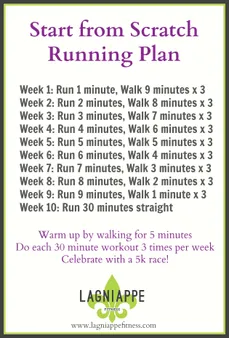
I. Proper Footwear Is Key
Proper Footwear Is Key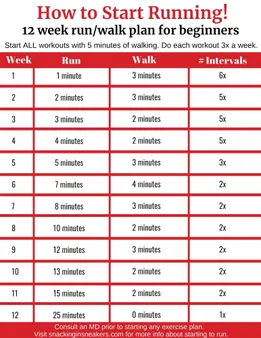
Running shoes are essential for protecting your feet and ankles from the impact of running. When choosing running shoes, it's important to consider your foot type, running style, and the terrain you'll be running on.
- Foot type: If you have flat feet, you'll need shoes that provide good arch support. If you have high arches, you'll need shoes that provide good cushioning.
- Running style: If you're a heel striker, you'll need shoes that provide good cushioning in the heel. If you're a midfoot striker, you'll need shoes that provide good cushioning in the midfoot and forefoot.
- Terrain: If you'll be running on mostly paved surfaces, you can choose a pair of road running shoes. If you'll be running on trails, you'll need a pair of trail running shoes that provide good traction and protection from rocks and roots.
Here are some tips for choosing running shoes:
- Go to a specialty running store: The staff at a specialty running store can help you find the right shoes for your foot type, running style, and terrain.
- Try on multiple pairs of shoes: Don't just buy the first pair of shoes you try on. Take some time to try on several different pairs to find the ones that fit the best.
- Walk and run around in the shoes: Once you've found a pair of shoes that fit well, take them for a walk or run around the store. Make sure they feel comfortable and that there are no pressure points.
If you take the time to choose the right running shoes, you'll be less likely to experience injuries and you'll enjoy your runs more. Learn more about the benefits of running.
Additional Tips for Choosing Running Shoes
- Consider the weight of the shoes: Lighter shoes are generally better for running, as they will require less energy to lift your feet.
- Look for shoes with good breathability: This will help keep your feet cool and dry during your runs.
- Make sure the shoes have a good fit: The shoes should fit snugly but not too tightly. You should have about a half-inch of space between your longest toe and the end of the shoe.
- Replace your running shoes every 300-500 miles: The cushioning in running shoes breaks down over time, so it's important to replace them every 300-500 miles to maintain good support and cushioning.
Check out our guide to the best running shoes for beginners.
II. Set Realistic Goals
Set Realistic Goals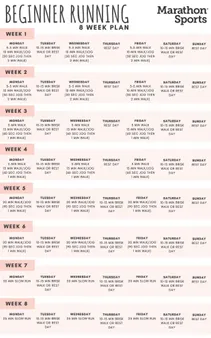
Setting realistic goals is essential for staying motivated and making progress in your running journey. Here's a list of tips for setting achievable goals:
- Start with a small, achievable goal, such as running for 10 minutes three times a week.
- Gradually increase your distance and frequency as you get stronger.
- Set a specific goal for each run, such as running a certain distance or time.
- Break down your long-term goals into smaller, more manageable milestones.
- Celebrate your successes along the way.
Remember that progress is not always linear. There will be times when you feel like you're not making progress, but it's important to keep going and stay focused on your goals. Just keep at it and eventually you will reach your goals.
Here's a quote from running coach Jeff Galloway: "The best way to predict your future is to create it." This quote is a reminder that you have the power to achieve your goals if you set your mind to it.
Goal | Timeline |
Run a 5K | 3 months |
Run a 10K | 6 months |
Run a half marathon | 1 year |
Run a marathon | 2 years |
Qualify for the Boston Marathon | 3 years |
As you progress in your running journey, you can set new and more challenging goals for yourself. The top running competitions and events can provide you with motivation and a sense of accomplishment.
Remember to listen to your body and take rest days when you need them. Listening to your body and avoiding injury is essential for long-term success in running.
III. Tips For New Runners
Tips For New Runners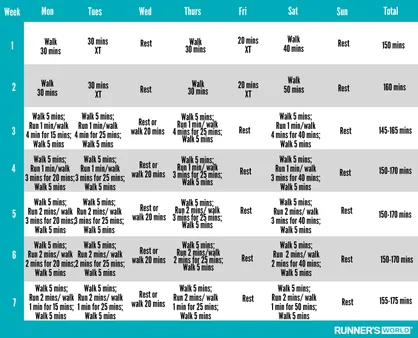
Set Realistic Goals
Don't try to do too much too soon. Start with a goal of running for 30 minutes three times per week. As you get stronger, you can gradually increase your distance and frequency.
- Start with a goal of running for 30 minutes three times per week.
- Gradually increase your distance and frequency as you get stronger.
- Don't try to do too much too soon.
Find a Running Buddy
Running with a friend can make it more enjoyable and help you stay motivated. You can also push each other to go further and faster.
- Running with a friend can make it more enjoyable and help you stay motivated.
- You can also push each other to go further and faster.
Choose the Right Shoes
Wearing the right shoes is essential for preventing injuries. Make sure your shoes fit well and provide good support.
- Wearing the right shoes is essential for preventing injuries.
- Make sure your shoes fit well and provide good support.
Warm Up and Cool Down
Always warm up before you start running and cool down afterwards. This will help to prevent injuries and improve your performance.
- Always warm up before you start running and cool down afterwards.
- This will help to prevent injuries and improve your performance.
Listen to Your Body
If you start to feel pain, stop running and rest. Don't push yourself too hard, or you could end up injured.
- If you start to feel pain, stop running and rest.
- Don't push yourself too hard, or you could end up injured.
Stay Hydrated
Drink plenty of water before, during, and after your run. Staying hydrated will help you to perform your best and avoid cramps.
- Drink plenty of water before, during, and after your run.
- Staying hydrated will help you to perform your best and avoid cramps.
Have Fun!
Running should be enjoyable, so make sure you're having fun. If you're not enjoying yourself, you're less likely to stick with it.
- Running should be enjoyable, so make sure you're having fun.
- If you're not enjoying yourself, you're less likely to stick with it.
Related Posts
- How to Choose the Right Running Shoes
- The Benefits of Running for Health and Wellness
- The Best Running Equipment and Gear
IV. Listen to Your Body
Listen to Your Body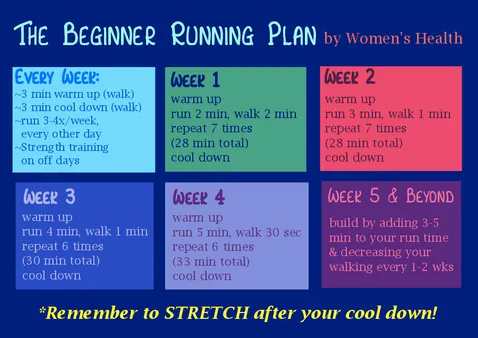
Running is a high-impact activity, so it's important to listen to your body and avoid pushing yourself too hard. If you start to feel pain, stop running and rest. Don't ignore pain, as it could be a sign of an injury. It's also important to pay attention to your breathing. If you're breathing too heavily, you may need to slow down or take a break. Running should be enjoyable, so if you're not having fun, don't be afraid to take a break or try a different activity.
Here are some tips for listening to your body while running:
- Start slowly and gradually increase your distance and intensity.
- Pay attention to your breathing. If you're breathing too heavily, you may need to slow down or take a break.
- If you start to feel pain, stop running and rest. Don't ignore pain, as it could be a sign of an injury.
- Stay hydrated by drinking plenty of water before, during, and after your run.
- Wear comfortable clothing and shoes that are designed for running.
- Run on a soft surface, such as a track or trail, to reduce the impact on your joints.
- Warm up before you run and cool down afterwards.
- Listen to your body and take breaks when you need them.
If you're new to running, it's a good idea to start with a walk-run program. This will help you gradually build up your endurance and avoid injury. You can also find a running coach or group to help you stay motivated and on track.
Running is a great way to improve your physical and mental health. By listening to your body and following these tips, you can make sure that you're running safely and enjoying the experience.
Related posts: The Benefits of Running for Health and Wellness, The Best Running Equipment and Gear, How to Improve Your Speed, Endurance, and Form with Running
V. Conclusion
Starting a running routine as a beginner can be daunting, but with the right approach and mindset, it can be an incredibly rewarding experience. Remember to start slowly, listen to your body, and set realistic goals for yourself. As you progress, you'll find that running becomes easier and more enjoyable. Embrace the journey, celebrate your achievements, and let running become a part of your healthy lifestyle. Whether you choose to run solo or join a running group, the benefits of running will extend beyond physical fitness, positively impacting your mental and emotional well-being. Lace up your running shoes, hit the pavement, and discover the joy of running as a beginner. Join the kizworld community of runners and share your journey with us!